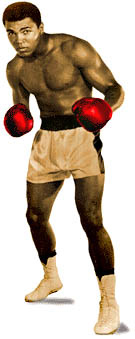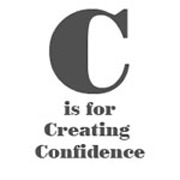C is for Confidence

by Aimee C. Kimball, PhD
 I believe confidence is one of the most critical factors in achieving peak performance. Muhammad Ali used to proclaim “I am the greatest!” before he actually was. This confident attitude was definitely a factor in his becoming one of the best. If you think back to matches you have played, you can undoubtedly come up with examples when confidence in your abilities helped you to beat an opponent or when lack of confidence caused you to lose to a team you shouldn’t have. Through this article your will learn how to create a confident attitude through choice, trust, and focus.
I believe confidence is one of the most critical factors in achieving peak performance. Muhammad Ali used to proclaim “I am the greatest!” before he actually was. This confident attitude was definitely a factor in his becoming one of the best. If you think back to matches you have played, you can undoubtedly come up with examples when confidence in your abilities helped you to beat an opponent or when lack of confidence caused you to lose to a team you shouldn’t have. Through this article your will learn how to create a confident attitude through choice, trust, and focus.
Confidence is a Choice
Many people think that the only way to be confident is to be successful. While it is true that it is easier to believe in your abilities when you have had proven success, it is not the only way to feel a sense of confidence. You must always remember that confidence is a choice. You decide how you want to view your abilities. You choose what you want to focus on in any given situation. You also choose to talk positively to yourself and to emphasize your strengths.
 We all know someone who isn’t good at something, yet thinks that they are. The people who audition for “American Idol” are a perfect example of this. Everyone across the country can see that many of the people who tryout are not the best singers in America (and sometimes could quite possibly be the worst). However, the singers themselves are confident because they choose to believe they are good. They are choosing to focus on the fact that they can sing (i.e., make sound come from their mouth) and that they are doing their best.
We all know someone who isn’t good at something, yet thinks that they are. The people who audition for “American Idol” are a perfect example of this. Everyone across the country can see that many of the people who tryout are not the best singers in America (and sometimes could quite possibly be the worst). However, the singers themselves are confident because they choose to believe they are good. They are choosing to focus on the fact that they can sing (i.e., make sound come from their mouth) and that they are doing their best.
At it’s simplest, confidence is the belief that you can successfully perform a chosen behavior. Whether your behavior is singing, returning a powerful serve, or conquering the screens, confidence comes not from judging whether you will be the best, but by trusting you can do your best.
How Can I Create Confidence?
The first step in creating confidence is to act confidently. Our mind reacts to what our body does. If your head is down, your muscles tense, or your shoulders hunched, your mind will sense your self-doubt. Especially after mistakes, you must make sure your body language is positive and is relaying a confident message to your brain (and to your opponent). If you act confidently eventually you will feel confident.
Second, it’s important to talk confidently, both to yourself and to your partner. Don’t say things to yourself that you would never let anyone else get away with (“I’m stupid, why did I do that?!?” “I am horrible, I shouldn’t even be out here!”) Eventually your negativity is going to affect your confidence and your performance. I also hear a lot of players making excuses to the other team before the game even starts (“This is our first time playing together”, “This is my first season of paddle”). It’s never a good idea to make excuses for poor performance before you even take the court-it shows you’ve already consigned to losing. Additionally, never apologize to your partner during a match. Too many people say “sorry” to their partner for mistakes. This creates a sense of guilt and leads you to second-guess future hits. Whenever you are second-guessing yourself it means you are lacking confidence. Rather than apologizing, say something positive that can reaffirm your confidence in yourself, such as “I’ll get it next time!” or “This point is ours!”
Finally, play confidently and trust your skill. I was competing against a team the other day that in warm-ups seemed like they were going to present quite a challenge. During the game though, they played it safe, hit gently, and didn’t serve very hard. The match was done quickly and afterwards we played a set for fun. During that set, they hit hard drives, had stronger serves, and were overall more aggressive. I asked them where that level of play was during the match and their response was, “Well, during the match it counted.” True. How you perform means something when you are keeping score, but if you are capable of playing at a high level, then why wouldn’t you when it counts? It all comes down to trust. You have to trust that your abilities will show up regardless of the situation. You have to trust that you are good and allow yourself to play that way. I know conventional paddle wisdom is to let the other team make the mistake, but I will always put my money on the team playing to win rather than playing not to lose.
A Confidence Building Activity
One way to build your confidence is to simplify the game. First, list all of the things you need to do to play well. Everything on your list has to be under your control and must be necessary for you to play your best. For example, your list may include things like:
- Bend my knees
- Stay on my toes
- Communicate with my partner
- Relax
Before games, pull out your list and ask yourself “Can I bend my knees? Can I stay on my toes?” etc… Since everything on your list is something you control and something you can do, you should be able to answer “yes” to each question. By writing it out and simplifying the game for yourself, you are creating a way to tell your mind “I can play this game.”
Make it Great!
If you have questions related to mental training that you would like answered in a future issue, feel free to contact Dr. Kimball.
Dr. Aimee C. Kimball is the Director of Mental Training at the University of Pittsburgh Medical Center's Center for Sports Medicine. She received a PhD from the University of Tennessee where she specialized in sport psychology. She is an Association of Applied Sport Psychology Certified Consultant, and is a member of the American Psychological Association, the United States Olympic Committee's Sport Psychology Registry, the USA Swimming Sports Medicine Network, and the NCAA Speakers professional, collegiate, high school, recreational, and youth athletes in a variety of sports, and assists the Pittsburgh Steelers in analyzing potential draft picks and the Pittsburgh Penguins in developing their players. Currently, Dr. Kimball works with athletes, coaches, corporate leaders, and other performers to assist them in achieving success in sport and life. (412-432-3777; kimballac@upmc.edu)







